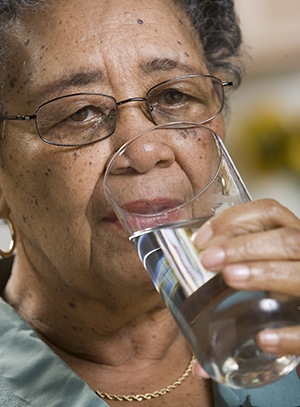Treating Diarrhea
Diarrhea happens when you have loose, watery, or frequent bowel movements. It's a common problem with many causes. Most cases of diarrhea clear up on their own. But certain cases may need treatment. Be sure to see your healthcare provider if your symptoms don't get better in a few days.
Getting relief
Treatment of diarrhea depends on its cause. Diarrhea caused by bacterial or parasite infection is often treated with antibiotics. Diarrhea caused by other factors, such as a stomach virus, often improves with simple home treatment. The tips below may also help ease your symptoms.

-
Drink plenty of fluids. This helps prevent too much fluid loss (dehydration). Water, clear soups, and electrolyte solutions are good choices. Don't have drinks with caffeine. Don't drink alcohol, coffee, tea, or milk. These can irritate your intestines and make symptoms worse.
-
Suck on ice chips first if drinking fluids makes you queasy.
-
Return to your normal diet slowly. You may want to eat bland foods at first, such as rice and toast. Also, you may need to stay away from certain foods for a while, such as dairy products. These can make symptoms worse. Ask your healthcare provider if there are any other foods you should stay away from.
-
If you were prescribed antibiotics, take them as directed. Finish the prescription even if you feel better.
-
Don't take anti-diarrhea medicines without asking your provider first.
-
Keep in mind that you may be infectious. Wash your hands often with soap and clean, running water or use an alcohol-based sanitizer that contains at least 60% alcohol.
Call your healthcare provider
Call your healthcare provider right away if you have any of the following:
-
A fever of 100.4°F ( 38.0°C) or higher, or as directed by your provider
-
Chills
-
Severe pain
-
Worsening diarrhea or diarrhea for more than 2 days
-
Bloody vomit or stool
-
Signs of dehydration (dizziness, dry mouth and tongue, rapid pulse, dark urine)
Online Medical Reviewer:
Jen Lehrer MD
Online Medical Reviewer:
L Renee Watson MSN RN
Online Medical Reviewer:
Rita Sather RN
Date Last Reviewed:
5/1/2022
© 2000-2024 The StayWell Company, LLC. All rights reserved. This information is not intended as a substitute for professional medical care. Always follow your healthcare professional's instructions.